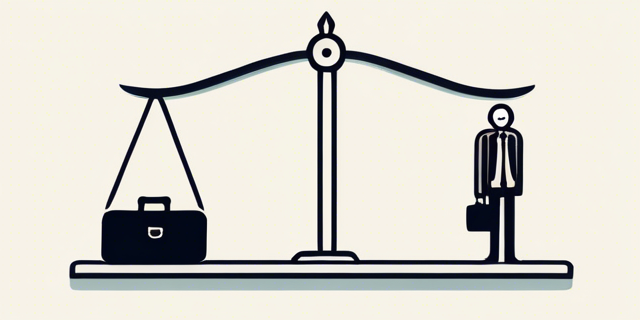In an evolving economic landscape, individuals often grapple with the choice between pursuing a traditional job or embarking on the entrepreneurial journey. Each path presents unique challenges and rewards. In this article, we will explore the pros and cons of both options, helping you make an informed decision based on your career aspirations and personal circumstances.
Understanding the Landscape: Job vs. Business and Entrepreneurship
Before we delve into the pros and cons, it’s essential to define the two paths clearly. A traditional job typically involves working for an organization in exchange for a salary, benefits, and job security. On the other hand, business ownership and entrepreneurship involve starting and managing your own venture, taking on greater risks but potentially enjoying greater rewards.
Pros of Having a Job
- Stability and Security One of the most significant advantages of a traditional job is the stability it offers. A regular paycheck, health benefits, and retirement plans create a safety net that many entrepreneurs may lack in the early stages of their ventures.
- Defined Work Hours Jobs generally come with set work hours. This structure can lead to a better work-life balance, allowing employees to arrange their personal lives around their professional commitments without the stress of ongoing work concerns at home.
- Less Responsibility In a job setting, individuals are not usually responsible for overarching business decisions. This reduces pressure, as employees can focus on their tasks and leave business-related issues to management.
- Opportunities for Growth Many companies invest in employee development, offering opportunities for training, mentorship, and promotions that can enhance career growth. Being part of a team also fosters networking that can be beneficial for future career advancement.
- Predictable Income Knowing exactly how much you’ll earn each month allows for better financial planning. This predictability can ease stress and provide a stable foundation for personal financial goals.
Cons of Having a Job
- Limited Control Employees often have little control over their work environment and responsibilities. This can lead to dissatisfaction if the company culture or job role does not align with personal values or interests.
- Cap on Earnings Traditional jobs typically come with a fixed salary, which can limit income potential. Hard work does not always equate to higher pay, making it difficult for high achievers to maximize their financial potential.
- Job Security Issues Although jobs offer a sense of security, layoffs and company downsizing are increasingly common. Economic downturns could jeopardize your position, leading to uncertainty.
- Office Politics Navigating workplace dynamics can be challenging. Office politics can impact job satisfaction, with decisions sometimes influenced more by relationship dynamics than actual performance.
- Limited Creativity Many jobs require adherence to established processes and standards, limiting opportunities for creativity and innovation. For individuals who thrive on thinking outside the box, this can be a significant drawback.
Pros of Business and Entrepreneurship
- Freedom and Autonomy Entrepreneurs enjoy the freedom of being their own boss. They have the authority to make decisions, set the company vision, and shape their work environment.
- Unlimited Earning Potential In business, earnings are often tied directly to the success of the enterprise. High-performing businesses can generate significant profits that far exceed a traditional salary.
- Pursuing Passion Many entrepreneurs start businesses based on their interests and passions. This can lead to fulfilling careers and a strong sense of purpose, often resulting in heightened motivation.
- Flexibility Business owners often have the flexibility to create their schedules. This adaptability can lead to a better work-life balance, allowing individuals to prioritize personal commitments or family life.
- Innovation Entrepreneurs have the ability to innovate and implement new ideas quickly. This agility can be a considerable advantage in today’s fast-paced environment, where adaptability is essential for success.
Cons of Business and Entrepreneurship
- Financial Risk Starting a business involves significant financial investment and risk. Entrepreneurs often face uncertainty, especially in the early stages when profits may be low or nonexistent.
- High Responsibility As a business owner, all decisions fall on your shoulders, from hiring and managing employees to navigating market challenges. This can be overwhelming for many entrepreneurs.
- Inconsistent Income Unlike a steady paycheck, business income can be unpredictable. Cash flow management is critical, and financial instability can create stress and uncertainty.
- Long Hours Entrepreneurs often work longer hours, especially in the startup phase. Balancing work and personal life can be challenging, leading to burnout if not managed effectively.
- Pressure and Stress The pressure to succeed can be intense. Entrepreneurs must constantly innovate and adapt to market conditions, which can lead to high levels of stress.
Conclusion: Making the Right Choice for You
Choosing between a traditional job and entrepreneurship is not a one-size-fits-all decision. It depends on individual goals, risk tolerance, and personal circumstances. For those who value security and structure, a traditional job may be the better fit. Conversely, if you seek autonomy, creativity, and the potential for unlimited earnings, entrepreneurship may be the way to go.
Consider your strengths, lifestyle aspirations, and financial situation before making a decision. Remember that many successful entrepreneurs started their venture while still employed, allowing them to mitigate some risks associated with entrepreneurship. Ultimately, understanding the pros and cons of each path can empower you to make informed choices that align with your career goals and personal values. Whether you choose a job or entrepreneurship, pursue a path that ignites your passion and leads you towards fulfillment and success.
FAQs: Job vs. Business and Entrepreneurship
1. What are the main advantages of having a job?
Answer:
- Stability: Jobs often come with a consistent paycheck, benefits, and job security.
- Work-Life Balance: Many jobs offer set hours, which can allow for a clearer separation between work and personal life.
- Benefits: Employers typically provide health insurance, retirement plans, paid time off, and other perks.
- Limited Risk: Employees usually do not bear financial risks; if the company doesn’t perform well, it’s the employer who absorbs the losses.
2. What are the disadvantages of having a job?
Answer:
- Limited Control: Employees often have little control over their work and must adhere to company policies and management decisions.
- Salary Cap: There may be limitations on salary increases, promotions, and career advancement.
- Job Dependence: Job security can be affected by company performance or economic downturns, leading to layoffs.
- Less Flexibility: Many jobs require adherence to a strict schedule and may not allow for remote work or flexible hours.
3. What are the main advantages of starting a business or engaging in entrepreneurship?
Answer:
- Autonomy: Entrepreneurs have greater control over their business direction, decisions, and work schedules.
- Unlimited Income Potential: Successful businesses can generate significant income, often exceeding a traditional salary.
- Creativity and Innovation: Entrepreneurs can pursue their passions and develop unique products or services based on their vision.
- Personal Growth: Running a business can lead to skill development and personal fulfillment as you navigate challenges and successes.
4. What are the disadvantages of starting a business or entrepreneurship?
Answer:
- Financial Risk: Entrepreneurs invest their own capital, and there’s a risk of losing money if the business fails.
- Workload and Stress: Starting a business often involves long hours, high pressure, and responsibilities that can lead to burnout.
- Uncertainty: Income can be inconsistent, especially in the early stages, and success is never guaranteed.
- Limited Benefits: Entrepreneurs may have to forgo traditional benefits like health insurance or retirement plans unless they create them for themselves.
5. Can a job provide opportunities for entrepreneurship?
Answer:
Yes, many individuals use their job as a foundation for entrepreneurship. Gaining industry experience, understanding market needs, and building professional networks can provide invaluable insights and connections for starting a business. Additionally, some may pursue side businesses while maintaining their job until they are ready to transition fully into entrepreneurship.
6. How do I decide between a job and starting a business?
Answer:
Consider factors such as your financial situation, risk tolerance, career goals, and personal circumstances. Assess your passion for entrepreneurship versus the desire for stability. It can also be helpful to evaluate your industry experience and market conditions to determine if it’s the right time to launch a business.
7. Is it possible to shift from a job to entrepreneurship later in life?
Answer:
Absolutely! Many successful entrepreneurs have transitioned from traditional jobs to starting their own businesses later in life. Skills, experiences, and networks acquired during your career can be highly beneficial in navigating the entrepreneurial landscape.




 Bitcoin
Bitcoin  Ethereum
Ethereum  Tether
Tether  XRP
XRP  Solana
Solana  Dogecoin
Dogecoin  USDC
USDC  Lido Staked Ether
Lido Staked Ether  Cardano
Cardano  TRON
TRON  Avalanche
Avalanche  Wrapped stETH
Wrapped stETH  Chainlink
Chainlink  Wrapped Bitcoin
Wrapped Bitcoin  Toncoin
Toncoin  Shiba Inu
Shiba Inu  Sui
Sui  Stellar
Stellar  Hedera
Hedera  Polkadot
Polkadot  WETH
WETH  LEO Token
LEO Token  Bitcoin Cash
Bitcoin Cash  Hyperliquid
Hyperliquid  Uniswap
Uniswap  Litecoin
Litecoin  Pepe
Pepe  Wrapped eETH
Wrapped eETH  Ethena USDe
Ethena USDe  NEAR Protocol
NEAR Protocol  Aptos
Aptos  USDS
USDS  Internet Computer
Internet Computer  Aave
Aave  Cronos
Cronos  Ethereum Classic
Ethereum Classic  POL (ex-MATIC)
POL (ex-MATIC)  Mantle
Mantle  WhiteBIT Coin
WhiteBIT Coin  MANTRA
MANTRA  Render
Render  Dai
Dai  Monero
Monero  Artificial Superintelligence Alliance
Artificial Superintelligence Alliance  Bittensor
Bittensor  Arbitrum
Arbitrum  Filecoin
Filecoin  OKB
OKB  Ethena
Ethena  Algorand
Algorand  Fantom
Fantom  Stacks
Stacks  Cosmos Hub
Cosmos Hub  Optimism
Optimism  Ondo
Ondo  Immutable
Immutable  Celestia
Celestia  Virtuals Protocol
Virtuals Protocol  Bonk
Bonk  Coinbase Wrapped BTC
Coinbase Wrapped BTC  Binance-Peg WETH
Binance-Peg WETH  Injective
Injective  The Graph
The Graph  Theta Network
Theta Network  dogwifhat
dogwifhat  THORChain
THORChain  Sei
Sei  Worldcoin
Worldcoin  Rocket Pool ETH
Rocket Pool ETH  Movement
Movement  Pudgy Penguins
Pudgy Penguins  FLOKI
FLOKI  Mantle Staked Ether
Mantle Staked Ether  Gate
Gate  JasmyCoin
JasmyCoin  Lombard Staked BTC
Lombard Staked BTC  Maker
Maker  Tokenize Xchange
Tokenize Xchange  GALA
GALA  Lido DAO
Lido DAO  Solv Protocol SolvBTC
Solv Protocol SolvBTC  Usual USD
Usual USD  KuCoin
KuCoin  NEXO
NEXO  Pyth Network
Pyth Network  The Sandbox
The Sandbox  Beam
Beam  Renzo Restaked ETH
Renzo Restaked ETH  Brett
Brett  Kaia
Kaia  Raydium
Raydium  Tezos
Tezos
Yes! Finally something about odessa forum.